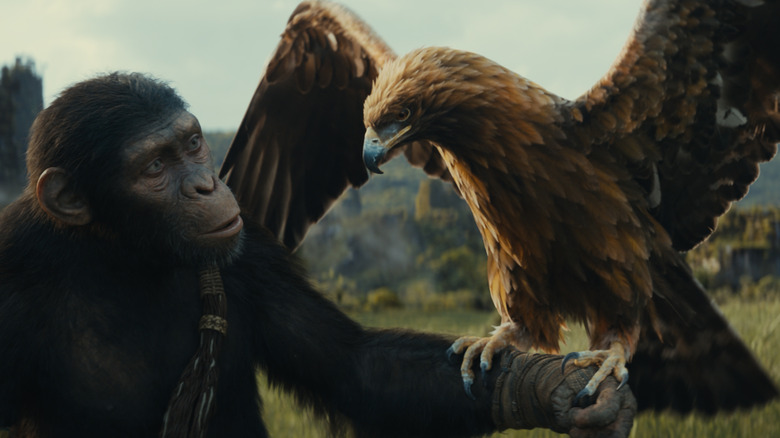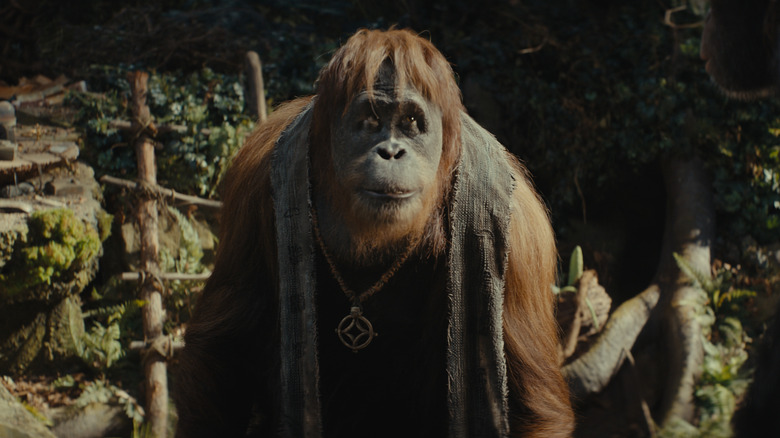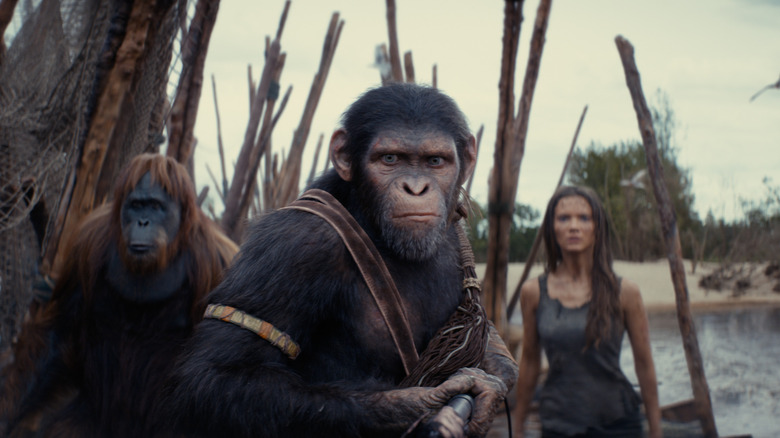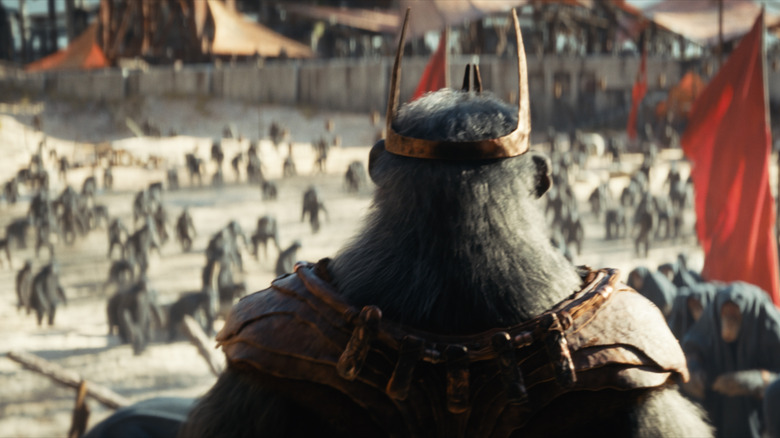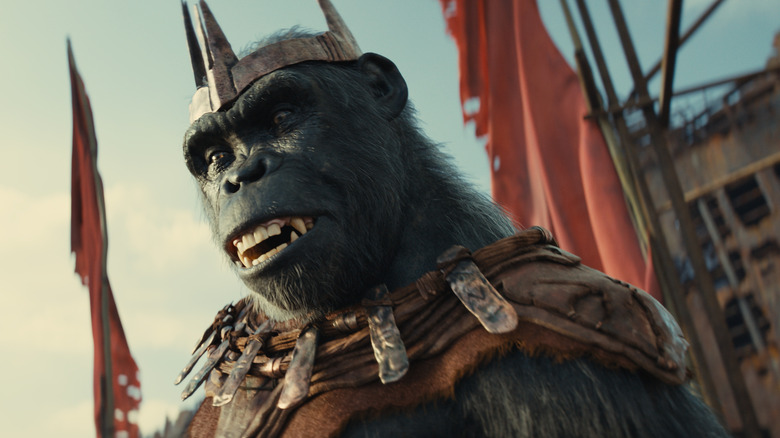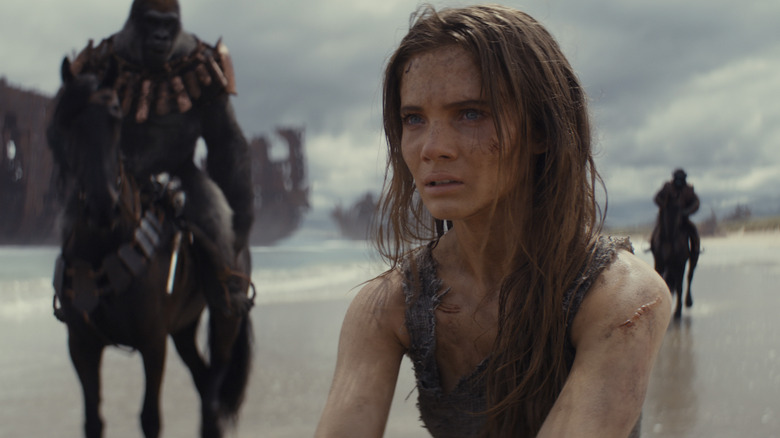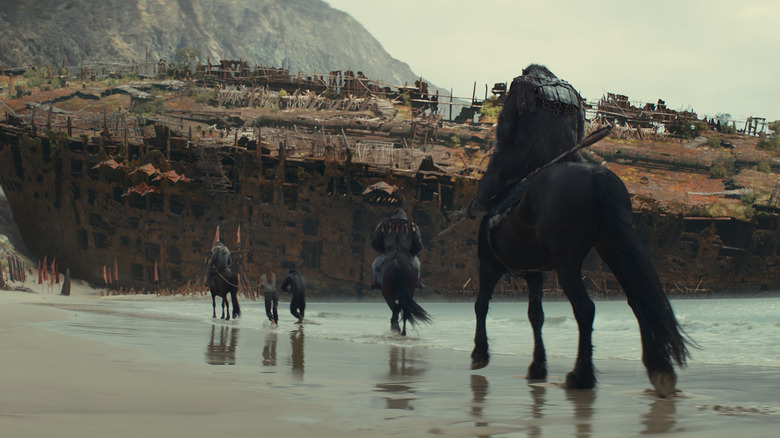Kingdom Of The Planet Of The Apes Ending Explained: War Never Changes
Spoilers follow.
The "Planet of the Apes" movies make up one of the best franchises in Hollywood history, always innovating in the world of special effects, delivering poignant and shockingly dark stories that delivered thrilling stories while also doing biting social commentary. It is also a franchise that has never been afraid to go weird — like when the first film's star tried to end the franchise by ending the world.
Then the reboot trilogy brought the franchise to the new century, with stunning, groundbreaking use of motion-capture and VFX and a bleak story about coexistence and humanity's cruelness toward the environment and nature.
Now, we're getting what could hopefully be the start of a new trilogy with "Kingdom of the Planet of the Apes," which is not a reboot of the reboot as initially rumored but rather a sequel to "War for the Planet of the Apes" set generations after the events of the previous film.
Whether you've just come out of the theater and want to make sure you understood what the hell just happened, or want to spoil yourself and make sure you're ready for what's ahead, let's break down the ending of "Kingdom of the Planet of the Apes."
What you need to remember before Kingdom of the Planet of the Apes
The reboot trilogy that started with "Rise of the Planet of the Apes" begins in modern times, as a human scientist trying to find a cure for Alzheimer's disease ends up creating a virus that makes apes super intelligent while proving deadly for humans. The trilogy mostly follows the backstory from the original saga, but with some timeline trickery to make the movies work as standalone stories.
"Kingdom of the Planet of the Apes" takes place many generations after the death of Caesar, the first smart ape and leader of the revolution. In the time since, Caesar has passed onto legend. The world he lived in, the idea that apes were ever silent or that humans were ever the dominant species is completely unbelievable to the apes who've only known a world where they can speak and live freely.
Likewise, Caesar's teachings are all but forgotten. Many clans (each with their own theme, just like the Na'vi from "Avatar") have out and, some don't even teach their young about Caesar the Lawgiver or his ideas — like apes being stronger together or apes not killing each other. The only apes who kept the idea of Caesar and his teachings alive belonged to the Order of Caesar, like the orangutan Raka.
What happens in Kingdom of the Planet of the Apes
"Kingdom of the Planet of the Apes" follows Noa, a young chimpanzee of the eagle clan about to do his bonding ceremony with his own eagle, as all apes in his tribe do. Plans go out the window the moment a chance encounter with a human draws the ire of Proximus Caesar, a ruthless Roman Empire-inspired clan chieftain who sends his soldiers to conquer and capture the apes of the eagle clan and destroy their homes.
This leads Noa to journey to Proximus' kingdom to save his people, accompanied by an orangutan named Raka, a wise follower of Caesar, and Nova, a young woman who joins them after being on the run from Proximus' apes.
Turns out Nova (real name Mae; she is named Nova by Raka because that is what apes call all humans, following the footsteps of Caesar) is not feral — she can talk (and maybe even sing, if we go by the rules of the "Stop the Planet of the Apes, I Want to Get Off!" musical). Mae is immune to the virus that turned humans mute, and is the only one capable of helping Proximus open his way to a silo filled with human weapons that could level everything to the ground.
How Kingdom of the Planet of the Apes ends
Proximus' plan is to open the silo in order to find technology that will speed up evolution, so he can become more human and use his intellect to conquer the world.
Wanting to free his people, Noa recruits Mae, who sneaks him and two other apes into the silo. Inside they find tanks and all sorts of weapons, and Mae steals a hard drive which she brings to her people to allow them to communicate with other humans across the country. Sadly, Mae also blows up a dam that surrounds the ape kingdom which destroys it, right after she shoots one of the apes. This proves that Proximus was right about mistrusting humans because even after the end of civilization they are still the bad guys who will stop at nothing to be back at the top of the food chain.
Still, Noa and his clan defeat Proximus with the help of their eagles (because apes together are strong), and they go back home to rebuild.
What the ending means
The reboot movies all focused on the idea of whether humans could coexist with apes, with anything other than (or even including) ourselves, and whether Caesar's ideals of peaceful coexistence were wrong. Generations after his death, nothing has changed, even if the world has. Caesar's tolerance and his ideals all come from a world long dead, and even if he did plenty right, he was also flawed and ultimately gave in to his desire for vengeance. He did save apes, but their society should evolve with the times. Toward the end, Proximus tells Noa that he is following the teachings of Caesar and Noa argues that maybe Caesar was wrong and they should not blindly follow him.
We are still hundreds of years away from George Taylor crashlanding back on Earth. Even if there are hints of that future in this movie — the larger ape civilizations, most humans don't talk anymore — we are still a long way to go until we get Dr. Zaius experimenting on humans. This brings us to another point. We're generations removed from the previous trilogy, and even if the main villain is an ape, it doesn't feel much different from the conflicts in Caesar's time.
Proximus is a bigger threat than Koba, sure, but this is essentially still an ape that kills other apes while trying to lead them into a better future — one free of humanity. Like Koba, Proximus recognizes that even when weakened by the virus and a lack of speech, humans are still dangerous and they'd slaughter every ape if they could. Meanwhile, the one human we follow does end up being just as treacherous as Proximus warned.
The humans of Kingdom of the Planet of the Apes
It's been generations since Caesar's death, a time when human civilization was already decimated thanks to the simian flu. Though that timeline is a bit unclear given apes don't live as long as humans, it is still at least a century later. However, the human characters here act as if they all remember the before times, when there shouldn't be anyone who was alive in the time of those movies left.
That is not a huge problem for "Kingdom of the Planet of the Apes," but rather a bit of a worrying sign for the future of the franchise. Whether there are plans to actually remake the original or not, it is hard to imagine the still-talking humans in this movie eventually disappearing to the point where there are no traces of humans ever being intelligent.
However, there is a movie from the original series that offers a clue. "Beneath the Planet of Apes" introduced a thriving human civilization where people still could speak and handle technology — except these humans are underground mutant telepaths. Perhaps that is the best way forward for this new potential trilogy: to slowly have the remnants of humanity evolve into mutants as apes grow smarter and more dominant.
The future of the planet of the apes
If this is the start of a new trilogy, where do we go from here? If the overarching progression of the previous trilogy was about Caesar building a community and keeping it safe from humans, this trilogy should be about apes not just being the dominant species on the planet, but also having a thriving civilization.
This movie introduced a Roman Empire-themed villain, and we have a long way to go before the advanced ape society from the original film shows itself. In the novel the original movie is based on, apes had a civilization looking just like ours did in the 1960s. If we go by that idea, then the next movie should jump further ahead or somehow show an ape society akin to the Mongol Empire, followed by a third movie that could introduce the ape equivalent of the Industrial Revolution.
To that point, "Kingdom of the Planet of the Apes" showed there are splintered ape communities, so hopefully, the next movie will expand on that idea and show that there are smart apes over more than just California, but across the entire country if not the world.
